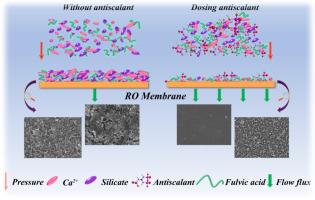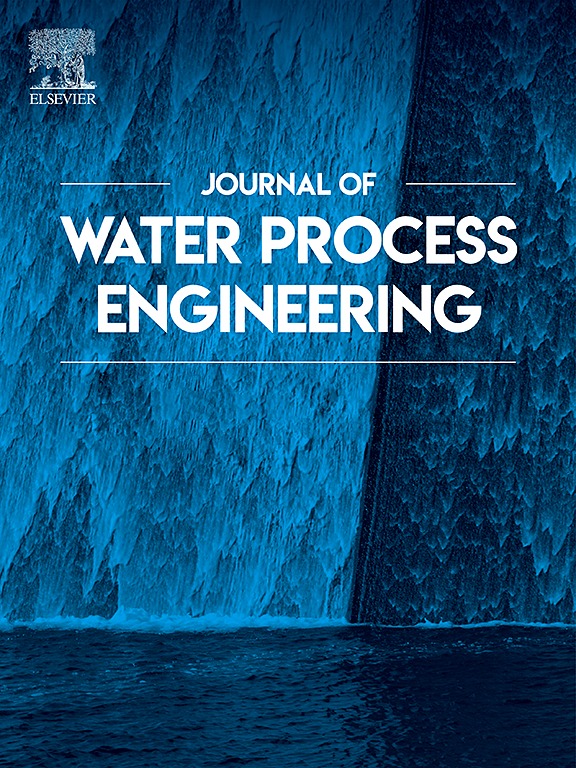Investigation of the effect of phosphonate antiscalants on the reverse osmosis membranes' permeation and desalination performance in mine wastewater treatment process
IF 6.3
2区 工程技术
Q1 ENGINEERING, CHEMICAL
引用次数: 0
Abstract
Contaminants in mine wastewater treatment processes can significantly impact the performance of reverse osmosis (RO) membranes. Antiscalants are commonly applied to the RO process to mitigate the deterioration of membrane permeation efficiency caused by fouling. Therefore, it is essential to gain an understanding of the role played by anti-scaling agents in RO operations. This work investigates the effects of three commonly used phosphonate antiscalants, namely ATMP (aminotris (methylenephosphonic acid)), HEDP (1-hydroxyethylidene-1, 1-bis (phosphonic acid)), and PBTC (2-phosphonobutane-1, 2, 4-tricarboxylic acid), on the permeation and desalination performances of RO membranes. The results showed that the presence of phosphonate antiscalants effectively inhibits interactions between components and between components and RO membranes, thereby enhancing membrane flux levels. However, the inhibitors may interact with the membrane surface and alter its properties, significantly affecting membrane performance. Excessive addition of antiscalants increases membrane contamination and deviates membrane flux from optimal levels. Furthermore, adding phosphonate inhibitors significantly affects the membrane retention efficiency of inorganic salt components and the extent to which the membrane retains organic wastewater components. This work provides insight into the role of phosphonate antiscalants in treating wastewater with soluble silica. It may offer a theoretical foundation for standardizing the use of antiscalants in industrial wastewater.

研究膦酸盐防垢剂对矿山废水处理工艺中反渗透膜渗透和脱盐性能的影响
矿山废水处理过程中的污染物会严重影响反渗透膜的性能。反渗透过程中通常会使用防垢剂,以减轻污垢导致的膜渗透效率下降。因此,了解防垢剂在反渗透操作中的作用至关重要。这项工作研究了三种常用的膦酸盐防垢剂,即 ATMP(氨基三(亚甲基膦酸))、HEDP(1-羟基亚乙基-1,1-双(膦酸))和 PBTC(2-膦酸丁烷-1,2,4-三羧酸)对反渗透膜的渗透和脱盐性能的影响。结果表明,膦酸盐防垢剂的存在能有效抑制成分之间以及成分与反渗透膜之间的相互作用,从而提高膜通量水平。但是,抑制剂可能会与膜表面相互作用,改变膜的特性,从而严重影响膜的性能。过量添加抗垢剂会增加膜污染,使膜通量偏离最佳水平。此外,添加膦酸盐抑制剂会严重影响无机盐成分的膜截留效率以及膜截留有机废水成分的程度。这项研究深入探讨了膦酸盐阻垢剂在处理含可溶性二氧化硅废水中的作用。它可以为规范工业废水中抗阻垢剂的使用提供理论基础。
本文章由计算机程序翻译,如有差异,请以英文原文为准。
求助全文
约1分钟内获得全文
求助全文
来源期刊

Journal of water process engineering
Biochemistry, Genetics and Molecular Biology-Biotechnology
CiteScore
10.70
自引率
8.60%
发文量
846
审稿时长
24 days
期刊介绍:
The Journal of Water Process Engineering aims to publish refereed, high-quality research papers with significant novelty and impact in all areas of the engineering of water and wastewater processing . Papers on advanced and novel treatment processes and technologies are particularly welcome. The Journal considers papers in areas such as nanotechnology and biotechnology applications in water, novel oxidation and separation processes, membrane processes (except those for desalination) , catalytic processes for the removal of water contaminants, sustainable processes, water reuse and recycling, water use and wastewater minimization, integrated/hybrid technology, process modeling of water treatment and novel treatment processes. Submissions on the subject of adsorbents, including standard measurements of adsorption kinetics and equilibrium will only be considered if there is a genuine case for novelty and contribution, for example highly novel, sustainable adsorbents and their use: papers on activated carbon-type materials derived from natural matter, or surfactant-modified clays and related minerals, would not fulfil this criterion. The Journal particularly welcomes contributions involving environmentally, economically and socially sustainable technology for water treatment, including those which are energy-efficient, with minimal or no chemical consumption, and capable of water recycling and reuse that minimizes the direct disposal of wastewater to the aquatic environment. Papers that describe novel ideas for solving issues related to water quality and availability are also welcome, as are those that show the transfer of techniques from other disciplines. The Journal will consider papers dealing with processes for various water matrices including drinking water (except desalination), domestic, urban and industrial wastewaters, in addition to their residues. It is expected that the journal will be of particular relevance to chemical and process engineers working in the field. The Journal welcomes Full Text papers, Short Communications, State-of-the-Art Reviews and Letters to Editors and Case Studies
文献相关原料
公司名称
产品信息
阿拉丁
HEDP
阿拉丁
ATMP
 求助内容:
求助内容: 应助结果提醒方式:
应助结果提醒方式:


